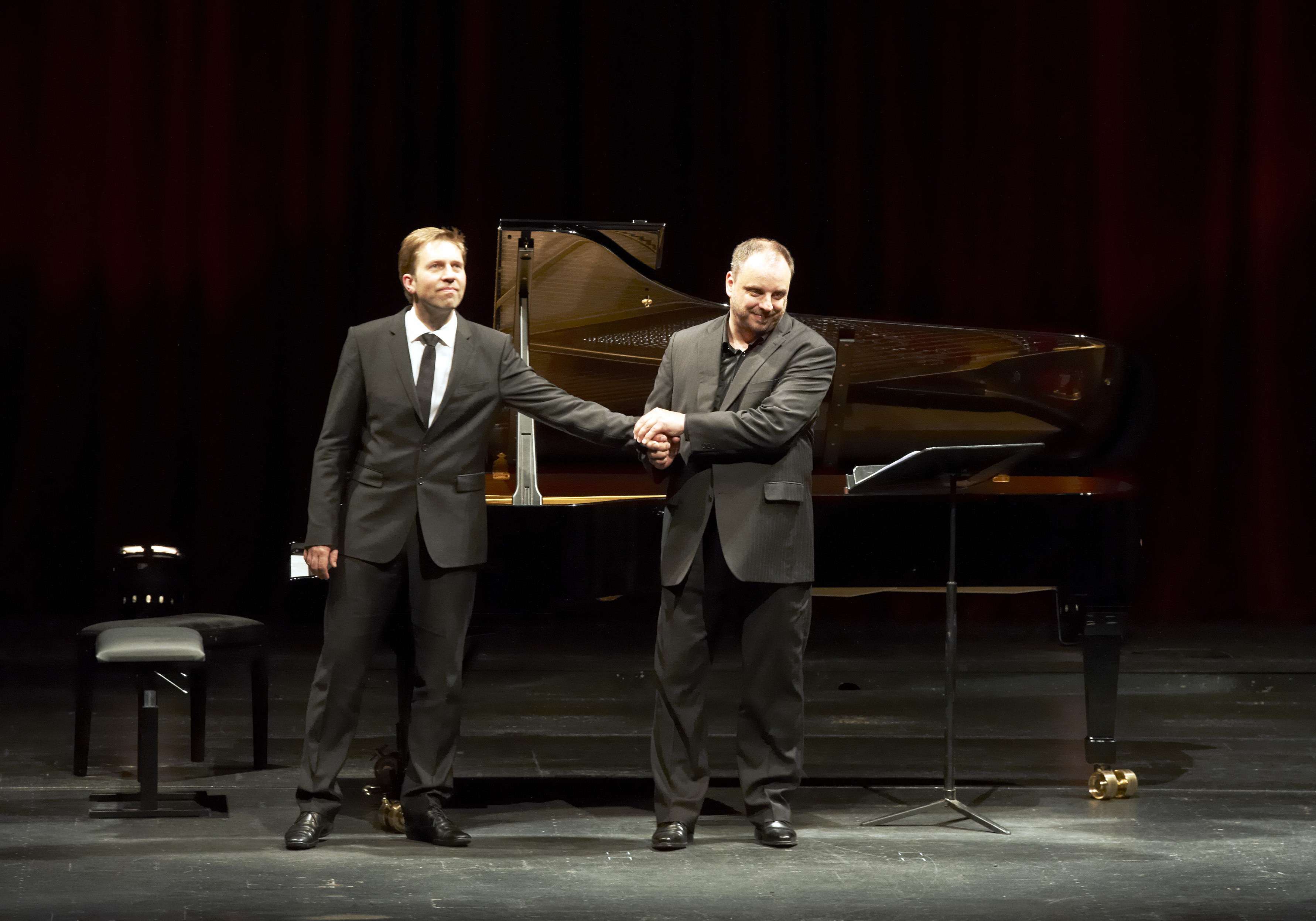|
Back
Death and a Glimmer of Hope Vienna
Staatsoper
05/30/2012 -
Gustav Mahler: Songs from Des Knaben Wunderhorn (“Urlicht”, “Wo die schönen Trompeten blasen”, “Es sungen drei Engel”, “Das irdische Leben”, “Revelge”, “Der Tambourg’sell”), Kindertotenlieder (“Nun seh’ ich wohl, warum so dunkel Flammen”, “Wenn dein Muetterlein”) & Rückert-Lieder (“Ich atmet’ einen linden Duft”, “Ich bin der Welt abhanden gekommen”)
Dmitri Shostakovich: songs from Michelangelo Suite, op. 145 (“Tomorrow”, “Separation”, “Night”, “Immortality”, “Dante”, and “Death”)
Matthias Goerne (baritone), Leif Ove Andsnes (piano) 
L. O. Andsnes & M. Goerne (© M. Pöhn/Wiener Staatsoper)
The preeminent German Lieder-Singer, Dietrich Fischer-Dieskau, had passed away less than two weeks ago. Fischer-Dieskau taught only a handful of students and Matthias Goerne was one of them. What more appropriate occasion for the Staatsoper Vienna to dedicate Goerne’s recital to the memory of Dietrich Fischer-Dieskau, that gentle giant of German Lied. Matthias Goerne had big shoes to fill.
The program for this recital was unusual to say the least: songs from Gustav Mahler’s cycles Des Knaben Wunderhorn, Kindertotenlieder and Rückert-Lieder were interspersed with selections from Dmitri Shostakovich’s Michelangelo Suite. At first glance, this seemed like a random potpourri. About three songs into the recital, however, all skepticism dissipated: this was one of the most intelligently and carefully woven recital programs I have come across.
Accompanied by Norvegian pianist Leif Ove Andsnes, Goerne opened the recital with one of Mahler’s Rückert-Songs Ich atmet’ einen linden Duft. Someone in the front rows disrespectfully began taking pictures of the performers, much to Mr. Goerne’s annoyance. Goerne interrupted the program and asked the audience to refrain from doing so. Photographing performers, preferably with flashlights, has unfortunately become common usance in concert halls all over the world.
After this little hick-up the concert resumed with Shostakovich’s Tomorrow and Mahler’s heart wrenching Wo die schönen Trompeten blasen. With this song and with Shostakovich’s Separation Goerne and Andsnes took their audience on an emotionally exhausting roller-coaster trip in search of the meaning of life, death and what comes afterwards. Gustav Mahler’s Es sungen drei Engel and three songs from the Kindertotenlieder succeeded each other, without any break. Urlicht, which Mahler also used in the last movement of his 4th Symphony, concluded the first part of this demanding program.
As if acting on premonition of the emotional strain of the songs to come, the audience gave the artists a warm and prolonged applause when they returned on stage for the second part of the program. Shostakovich’s Night and Mahler’s treasure Ich bin der Welt abhanden gekommen, seamlessly attached, were followed by Immortality and Dante by Shostakovich. There followed Mahler’s Revelge and Shostakovich’s Death. The recital ended with a chilling performance of Mahler’s Tamboursg’sell.
In the days preceding this recital at the Staatsoper, the Viennese press was flooded with interviews of Matthias Goerne – probably in a desperate (but scantly successful) attempt to fill the hall. Not a single story where Goerne was not compared to his teacher Fischer-Dieskau. These comparisons make little sense, each artist being unique in his or her own way. With his resonant baritone that can be heart wrenching, Mr. Goerne has at his command an impressive range of colors that he knows how to use. His diction not as pronounced as his teacher’s, his voice nevertheless projects with clarity. Leif Ove Andsnes was an outstanding piano partner. There was hardly a single detail in Mahler’s and Shostakovich’s scores that was lost in his hands. But this all seemed irrelevant: Goerne and Andsnes served as the ideal medium for the evening’s poetry and music. Much food for thought and a most memorable evening at the Staatsoper.
After this somber and spiritual inward-journey, Goerne and Andsnes closed the evening with Beethoven’s An die Hoffnung… a glimmer of hope at the end!
Staatsoper Vienna
Matthias Goerne
Leif Ove Andsnes
Wiebke Kuester
|